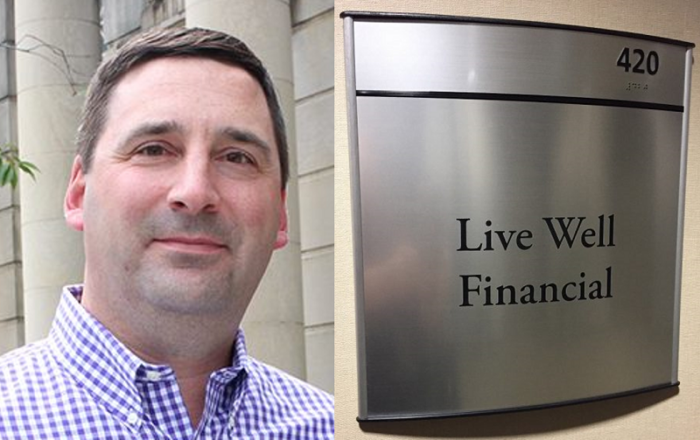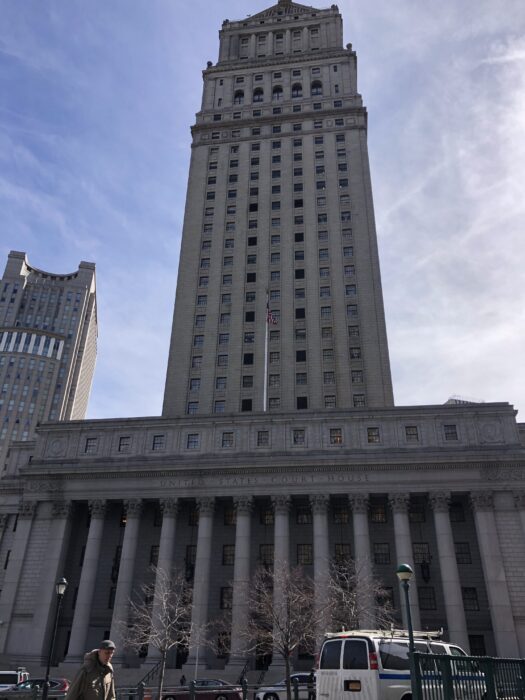This time pointing the finger at his former firm’s lenders, embattled Richmond businessman Michael Hild is back on the offensive as he continues his fight to remain out of prison and overturn his criminal fraud conviction.
The former Live Well Financial CEO last week filed a request for a new trial, his second such request since a jury found him guilty on all counts in 2021 for his role in a bond scheme that helped topple the once-fast-growing Chesterfield-based reverse mortgage company.
This latest attempt, which comes as Hild is already appealing that initial verdict and 44-month sentence, seizes on new evidence that has come to light during recent arguments over how much in restitution he should pay his victims.
Those victims are several large lenders – the same lenders that forced Live Well into bankruptcy in 2019 and helped spark the federal government’s indictment of Hild and two other former Live Well executives on charges that the true value of the company’s reverse mortgage bond portfolio had been intentionally and illegally inflated.
As Hild’s legal team in recent months had been sparring with the U.S. Attorney’s Office over the amount of restitution owed, the lenders were required to submit additional documentation of the damages they suffered as a result of the Live Well saga.
Those documents, Hild’s attorney claims, show that the lenders had since pocketed tens of millions of dollars by holding onto the reverse mortgage bonds after foreclosing on them and reaping interest payments. Those payments, Hild claims in the May 29 request, were unknown to his defense team during the trial three years ago and may contradict the testimony of the lender representatives at trial.
“The restitution materials reveal in detail for the first time the degree to which certain of the lenders have been secretly pocketing tens of millions of dollars in coupon payments from the bonds at issue since they took custody of those bonds following those same lenders placing Live Well in default,” the motion states. “The witnesses who represented the lenders, meanwhile, gave what is now revealed as misleading testimony about their institutions’ unwillingness to hold the bonds and the lack of revenues the bonds were generating.”
The lenders in question are Mirae Asset Securities, Industrial and Commercial Bank of China, Flagstar Bank and Customers Bank.
They each floated tens of millions of dollars in loans to Live Well using the reverse mortgage bonds as collateral. After Live Well was forced into bankruptcy at the lenders’ urging, the lenders took control of the bonds and held some of them for at least a short period of time and recouped interest payments in the meantime.
As an example, Hild’s camp points to ICBC’s recent letters to the court showing that it held the Live Well bonds for nearly two years and collected approximately $40 million in interest payments during that period.
Mirae similarly recouped $34 million and Flagstar collected at least $18 million from interest payments, Hild’s argument states.
In total, Hild’s filing argues that the lenders collected in excess of $100 million in interest payments while holding the bonds over a brief period of time before ultimately selling them.
Meanwhile, the government and the lenders claim they are owed a total of $69 million in restitution from Hild and his two co-conspirators.
Hild’s camp claims the newfound funds call into question whether any restitution is owed and whether some of the lenders may have in the end profited from holding the bonds.
“Indeed, the submissions call into question whether some of the lenders suffered losses at all,” the filing argues.
In calling for a new trial, Hild’s attorney argues that the existence of those payments proves what Hild argued at trial: that he had no intent to defraud the lenders in part because he thought the lenders were able to benefit and be made whole from the interest payments in the event of a default.
“These large payments undermine the government’s position at trial, suggest that the bonds were performing in line with the defense position at trial, and indicate that these institutions’ own decisions to sell the bonds in fire sales – not the offense conduct – is what caused the losses claimed,” the motion claims. “Indeed, the evidence instead corroborates the defense’s arguments at trial that the bonds were properly valued and that the lenders were fully secured (and thus that Mr. Hild did not have an intent to defraud).”
Hild’s attorney argues that a new trial is the only viable option in light of the new evidence. The motion calls for U.S. District Court Judge Ronnie Abrams to rule one of three ways: to defer the motion for a new trial until Hild’s current appeal plays out; deny the motion; or state that a new trial is warranted if the appeals court remanded the matter back to the lower court. The latter is the ideal outcome for Hild.
Judge Abrams is the same judge who oversaw Hild’s trial and struck down his first request for a new trial last year, when he sought to blame his previous attorney for faulty representation. Abrams wasted little time in addressing Hild’s new request and last week ordered the government to file a response to Hild’s new-trial motion no later than June 16. Hild would then have the chance to file a response no later than June 30. The government’s response had yet to be filed by Sunday afternoon.
Hild’s attorney, Brian Jacobs of New York law firm Morvillo, Abramowitz, Grand, Iason & Anello, declined to comment on the new trial request.
Hild’s renewed offensive comes less than a month after Live Well’s former CFO Eric Rohr was sentenced by Abrams to no prison time and three years of supervised release for the same crimes Hild was charged with.
Unlike Hild, who pleaded not guilty and has remained free on bond for four years, Rohr pleaded guilty and cooperated as a key witness in the government’s case against his former boss.
Rohr, at his sentencing hearing last month, said “I pled guilty because I, in fact, was guilty and am guilty. During these 44 months (since being charged), my crimes and the process has given me an enhanced understanding of accountability. Accountability is both empowering and liberating.”
Also charged in the case was Live Well’s former head bond trader, Darren Stumberger. He too has pleaded guilty to the same charges as his two former colleagues and awaits sentencing.
This time pointing the finger at his former firm’s lenders, embattled Richmond businessman Michael Hild is back on the offensive as he continues his fight to remain out of prison and overturn his criminal fraud conviction.
The former Live Well Financial CEO last week filed a request for a new trial, his second such request since a jury found him guilty on all counts in 2021 for his role in a bond scheme that helped topple the once-fast-growing Chesterfield-based reverse mortgage company.
This latest attempt, which comes as Hild is already appealing that initial verdict and 44-month sentence, seizes on new evidence that has come to light during recent arguments over how much in restitution he should pay his victims.
Those victims are several large lenders – the same lenders that forced Live Well into bankruptcy in 2019 and helped spark the federal government’s indictment of Hild and two other former Live Well executives on charges that the true value of the company’s reverse mortgage bond portfolio had been intentionally and illegally inflated.
As Hild’s legal team in recent months had been sparring with the U.S. Attorney’s Office over the amount of restitution owed, the lenders were required to submit additional documentation of the damages they suffered as a result of the Live Well saga.
Those documents, Hild’s attorney claims, show that the lenders had since pocketed tens of millions of dollars by holding onto the reverse mortgage bonds after foreclosing on them and reaping interest payments. Those payments, Hild claims in the May 29 request, were unknown to his defense team during the trial three years ago and may contradict the testimony of the lender representatives at trial.
“The restitution materials reveal in detail for the first time the degree to which certain of the lenders have been secretly pocketing tens of millions of dollars in coupon payments from the bonds at issue since they took custody of those bonds following those same lenders placing Live Well in default,” the motion states. “The witnesses who represented the lenders, meanwhile, gave what is now revealed as misleading testimony about their institutions’ unwillingness to hold the bonds and the lack of revenues the bonds were generating.”
The lenders in question are Mirae Asset Securities, Industrial and Commercial Bank of China, Flagstar Bank and Customers Bank.
They each floated tens of millions of dollars in loans to Live Well using the reverse mortgage bonds as collateral. After Live Well was forced into bankruptcy at the lenders’ urging, the lenders took control of the bonds and held some of them for at least a short period of time and recouped interest payments in the meantime.
As an example, Hild’s camp points to ICBC’s recent letters to the court showing that it held the Live Well bonds for nearly two years and collected approximately $40 million in interest payments during that period.
Mirae similarly recouped $34 million and Flagstar collected at least $18 million from interest payments, Hild’s argument states.
In total, Hild’s filing argues that the lenders collected in excess of $100 million in interest payments while holding the bonds over a brief period of time before ultimately selling them.
Meanwhile, the government and the lenders claim they are owed a total of $69 million in restitution from Hild and his two co-conspirators.
Hild’s camp claims the newfound funds call into question whether any restitution is owed and whether some of the lenders may have in the end profited from holding the bonds.
“Indeed, the submissions call into question whether some of the lenders suffered losses at all,” the filing argues.
In calling for a new trial, Hild’s attorney argues that the existence of those payments proves what Hild argued at trial: that he had no intent to defraud the lenders in part because he thought the lenders were able to benefit and be made whole from the interest payments in the event of a default.
“These large payments undermine the government’s position at trial, suggest that the bonds were performing in line with the defense position at trial, and indicate that these institutions’ own decisions to sell the bonds in fire sales – not the offense conduct – is what caused the losses claimed,” the motion claims. “Indeed, the evidence instead corroborates the defense’s arguments at trial that the bonds were properly valued and that the lenders were fully secured (and thus that Mr. Hild did not have an intent to defraud).”
Hild’s attorney argues that a new trial is the only viable option in light of the new evidence. The motion calls for U.S. District Court Judge Ronnie Abrams to rule one of three ways: to defer the motion for a new trial until Hild’s current appeal plays out; deny the motion; or state that a new trial is warranted if the appeals court remanded the matter back to the lower court. The latter is the ideal outcome for Hild.
Judge Abrams is the same judge who oversaw Hild’s trial and struck down his first request for a new trial last year, when he sought to blame his previous attorney for faulty representation. Abrams wasted little time in addressing Hild’s new request and last week ordered the government to file a response to Hild’s new-trial motion no later than June 16. Hild would then have the chance to file a response no later than June 30. The government’s response had yet to be filed by Sunday afternoon.
Hild’s attorney, Brian Jacobs of New York law firm Morvillo, Abramowitz, Grand, Iason & Anello, declined to comment on the new trial request.
Hild’s renewed offensive comes less than a month after Live Well’s former CFO Eric Rohr was sentenced by Abrams to no prison time and three years of supervised release for the same crimes Hild was charged with.
Unlike Hild, who pleaded not guilty and has remained free on bond for four years, Rohr pleaded guilty and cooperated as a key witness in the government’s case against his former boss.
Rohr, at his sentencing hearing last month, said “I pled guilty because I, in fact, was guilty and am guilty. During these 44 months (since being charged), my crimes and the process has given me an enhanced understanding of accountability. Accountability is both empowering and liberating.”
Also charged in the case was Live Well’s former head bond trader, Darren Stumberger. He too has pleaded guilty to the same charges as his two former colleagues and awaits sentencing.






Fascinating case – would he still be guilty of over inflating the value of his assets if they rule that the Lenders were not harmed? Sentence reduced?